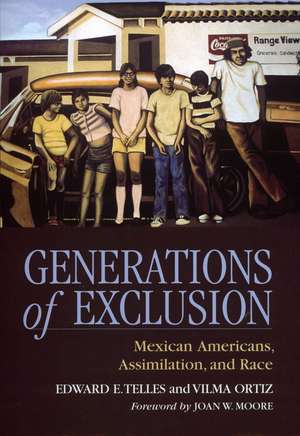Generations of Exclusion: Mexican-Americans, Assimilation, and Race
Autor Edward E. Telles, Vilma Ortiz Cuvânt înainte de Joan W. Mooreen Limba Engleză Paperback – 10 dec 2009
Foreword by Joan W. Moore When boxes of original files from a 1965 survey of Mexican Americans were discovered behind a dusty bookshelf at UCLA, sociologists Edward Telles and Vilma Ortiz recognized a unique opportunity to examine how the Mexican American experience has evolved over the past four decades. Telles and Ortiz located and re-interviewed most of the original respondents and many of their children. Then, they combined the findings of both studies to construct a thirty-five year analysis of Mexican American integration into American society. Generations of Exclusion is the result of this extraordinary project. Generations of Exclusion measures Mexican American integration across a wide number of dimensions: education, English and Spanish language use, socioeconomic status, intermarriage, residential segregation, ethnic identity, and political participation. The study contains some encouraging findings, but many more that are troubling. Linguistically, Mexican Americans assimilate into mainstream America quite well—by the second generation, nearly all Mexican Americans achieve English proficiency. In many domains, however, the Mexican American story doesn't fit with traditional models of assimilation. The majority of fourth generation Mexican Americans continue to live in Hispanic neighborhoods, marry other Hispanics, and think of themselves as Mexican. And while Mexican Americans make financial strides from the first to the second generation, economic progress halts at the second generation, and poverty rates remain high for later generations. Similarly, educational attainment peaks among second generation children of immigrants, but declines for the third and fourth generations. Telles and Ortiz identify institutional barriers as a major source of Mexican American disadvantage. Chronic under-funding in school systems predominately serving Mexican Americans severely restrains progress. Persistent discrimination, punitive immigration policies, and reliance on cheap Mexican labor in the southwestern states all make integration more difficult. The authors call for providing Mexican American children with the educational opportunities that European immigrants in previous generations enjoyed. The Mexican American trajectory is distinct—but so is the extent to which this group has been excluded from the American mainstream. Most immigration literature today focuses either on the immediate impact of immigration or what is happening to the children of newcomers to this country. Generations of Exclusion shows what has happened to Mexican Americans over four decades. In opening this window onto the past and linking it to recent outcomes, Telles and Ortiz provide a troubling glimpse of what other new immigrant groups may experience in the future.
Preț: 130.13 lei
Nou
Puncte Express: 195
Preț estimativ în valută:
24.90€ • 25.100$ • 20.61£
24.90€ • 25.100$ • 20.61£
Carte indisponibilă temporar
Doresc să fiu notificat când acest titlu va fi disponibil:
Se trimite...
Preluare comenzi: 021 569.72.76
Specificații
ISBN-13: 9780871548498
ISBN-10: 0871548496
Pagini: 416
Dimensiuni: 168 x 235 x 36 mm
Greutate: 0.62 kg
Editura: Russell Sage Foundation
Colecția Russell Sage Foundation
ISBN-10: 0871548496
Pagini: 416
Dimensiuni: 168 x 235 x 36 mm
Greutate: 0.62 kg
Editura: Russell Sage Foundation
Colecția Russell Sage Foundation
Notă biografică
EDWARD E. TELLES is professor of sociology at the University of California, Los Angeles. VILMA ORTIZ is associate professor of sociology at the University of California, Los Angeles.
Cuprins
Acknowledgements Foreword by Joan Moore Chapter 1: Introduction Chapter 2: Theoretical Background Chapter 3: The Mexican American Study Project Chapter 4: The Historical Context Chapter 5: Education Chapter 6: Socio-Economic Status Chapter 7: Inter-Ethnic Relations Chapter 8: Culture and Language Chapter 9: Ethnic Identity. Chapter 10: Politics Chapter 11: Conclusions References Appendix A: Child Survey Appendix B: Multivariate Analyses
